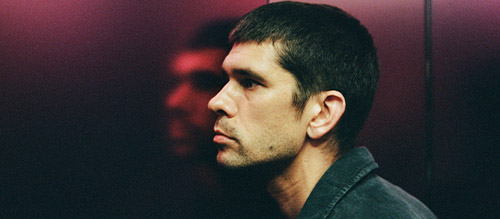Surge (2021) Review – GFF
This article was written exclusively for The Film Magazine by Jack Cameron.
Surge (2021)
Director: Aneil Karia
Screenwriters: Rupert Jones, Rita Kalnejais
Starring: Ben Whishaw, Jasmine Jobson, Ellie Haddington
Ben Whishaw’s role in Surge could not be further away from the fluffy Peruvian bear we’ve all come to know and love. In fact, it’s very different from almost anything else he has ever done. As Joseph, Whishaw is a psychotic ball of energy constantly moving and constantly surprising you with what he’ll do next. He’s matched by the wild, kinetic energy of the film which presents him rushing through an angry and violent world, struggling to keep up.
A feature debut from director Aneil Karia, who also gets a story credit on this screenplay by Rupert Jones and Rita Kalnejais, Surge exclusively follows Whishaw’s Joseph, shooting with long telephoto lenses as if to treat the character as the subject of a documentary. The camera is glued to Joseph with a passive eye; there’s no judgment or comment coming from the filmmakers – it’s as if they too just want to watch with a grim fascination.
Opening in a crowded airport, we slowly manage to spot Joseph who works at security. He seems to be an outsider, ignored by his colleagues and impassive towards the passengers streaming through the gates. He has two encounters with people who appear to recognise him; as he’s patting them down they each whisper cryptic nothings in his ear. Then, out of nowhere, they start to sprint away. They don’t get very far before they’re tackled to the ground.
Rupert Jones is no stranger to the surreal; his previous films (such as Kaleidoscope, 2016) have always delved into the weird and bizarre. Surge isn’t necessarily a surreal film, but it doesn’t quite fit within the real. The world surrounding Joseph feels a little uncanny and slightly exaggerated. As we watch him walk home, several instances of violence and aggression erupt around him. The camera just catches them as he walks past, largely unfazed by it. Nearly every character Joseph meets, including his parents and his colleagues, seem unnaturally aggressive. As he starts to behave more and more strangely at work, no one tries to calm him down or treat him with sympathy, only further anger and confusion. His parents too, seem perpetually disappointed by him, all of which, slowly and creepily, begins to create an image of a world out of joint, Joseph the quiet and shy man alone at the centre of it.
The majority of Surge takes place over one day and follows Joseph on what can only be described as a light-hearted rampage. He rushes around London, wildly reacting to everything that comes his way; trying to help a friend leads him to a shop, a faulty credit card leads him to a bank, unable to withdraw money he decides to rob the place. Whishaw plays all of this with virtually no dialogue and instead bursts into gales of wild laughter or withdraws into silence, gurning and trembling. From beginning to end, the film tries to build a huge adrenaline rush similar to that in Falling Down, using Whishaw’s wild energy to drive the film forward more than anything else.
Purely because it was such a high-profile release, it’s difficult not to see comparisons between Surge and Joker. Both films see a man bullied and rejected by the world make a life-altering decision in the name of self-liberation. However, Joseph doesn’t have any of Arthur Fleck’s toxicity or need for attention. Everything he does seems to be just for himself – he frequently apologises to cashiers whilst he’s robbing them, and it seems that despite his bursts of violence he doesn’t want to hurt anyone. Surge offers no insight into Joseph’s mind and instead expects us simply to go along with him. This is certainly more of an experiential film than a narrative one, which produces a few great moments but not a cohesive single picture.
In one instance Karia has his camera follow Whishaw up and down a street, never cutting away as he runs from building to building. It is a very uncomfortable sequence that creates more tension than some films can on double the budget. Unfortunately, there’s not really another moment that lives up to this one, and Surge frequently loses the momentum it does so well to build up out of nowhere.
This delayed 2020 release may not leave much of an impact once the credits start rolling, but while it plays it does a good job of balancing rising adrenaline with crushing discomfort. Surge is an impressive if not wholly successful debut from Aneil Karia that is headlined by an unforgettable and unrecognisable performance from Ben Whishaw.
16/24
Written by Jack Cameron
You can support Jack Cameron in the following places:
Twitter – @JackCam86118967
Contently – Jack Cameron


